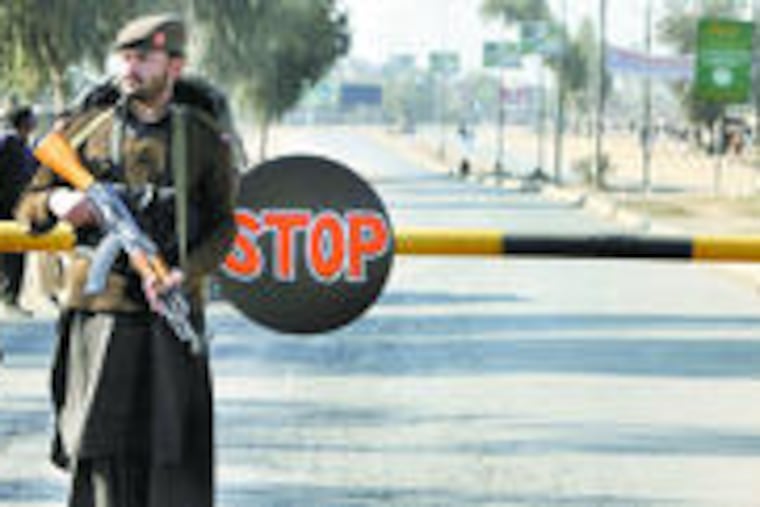Pakistan shuts supply line while targeting extremists
It suspended U.S. shipments to Afghanistan through the Khyber Pass. U.S. officials call it a temporary snag.

PESHAWAR, Pakistan - Pakistan suspended truck shipments of U.S. military supplies to Afghanistan through the famed Khyber Pass yesterday after launching an offensive against extremists who are trying to cripple Washington's war on a resurgent Taliban in neighboring Afghanistan.
The U.S. military said a temporary closure of the key supply line was not a problem, and praised the campaign in the rugged hills of northwestern Pakistan where al-Qaeda leaders, including Osama bin Laden, are believed hiding.
The operation came amid tensions between Pakistan and its eastern neighbor, India, triggered by last month's deadly attack in Mumbai, which the Indian government and Washington have blamed on Islamic extremists based in Pakistan. Pakistan urged India to pull back troops that it said had been sent near their border after Islamabad began moving troops toward the frontier. India said it had done nothing to aggravate tensions between the nuclear-armed neighbors. Both countries also appealed for calm.
Militants in the Khyber Pass have vowed to choke off supplies heading across Pakistan's western border to American and NATO troops in Afghanistan, where fighting is escalating seven years after the U.S.-led invasion toppled a Taliban regime.
Western forces in landlocked Afghanistan rely on the winding, mountainous road for delivery of up to 75 percent of their fuel, food and other goods, which arrive in Pakistan via the port city of Karachi. Ammunition and weapons are flown in.
With the United States preparing to almost double the number of its soldiers in Afghanistan next year, the Western forces already were looking for alternate supply routes. Last month, the Associated Press reported that NATO was close to reaching deals with Central Asian countries north of Afghanistan that would allow the alliance to truck in "non-lethal" supplies from there. NATO has reached a similar agreement with Russia.
Tariq Hayat Khan, the top administrator in the Khyber area, said yesterday that Pakistani security forces using helicopter gunships and heavy artillery were striking at extremists. Another official in the region said the road was closed because of the offensive.
"This operation will continue until the goal is achieved, which is nothing less then the elimination of troublemakers," Khan said. He said he had no information on any casualties. Neither official said how long the road might be closed.
Suspected extremists staged a series of raids on truck depots near the Pakistani city of Peshawar in recent weeks at the entrance to the pass, killing several guards and burning hundreds of vehicles.
In November, militants ambushed a supply convoy in the pass and seized several humvees headed for U.S. troops. They were pictured driving off in the vehicles, scoring a major propaganda victory.
U.S. commanders insist the extremist attacks on the supply line have not disrupted their mission in Afghanistan. They also say they have enough supplies to last many weeks in case shipping routes are blocked.
On a normal day, about 300 trucks carrying military supplies travel up the Khyber Pass. Media reports have said truck companies were becoming increasingly unwilling to transport the goods because of the danger.
Landslide Vote in Bangladesh
An alliance led
by former Prime Minister Sheik Hasina Wajed
won a landslide victory in Bangladesh's first election in seven years, amid hopes her mandate would help restore democracy
and stability to the nation.
Wajed's secular
Awami League is expected to form a government after her alliance won 260 of the 300 seats in Parliament.
Rivals led
by former Prime Minister Khaleda Zia accused Wajed's group of vote-buying and dirty tricks. The allegations raised the specter of a return to the divisive accusations and demonstrations that have made it difficult to govern effectively.
Some 200,000 observers
, including more than 2,000 foreigners, monitored the balloting, which
was deemed free and fair.
Analysts attributed
the victory to Wajed's poverty-alleviation promises, better political organization, and a desire for change after Zia's 1991-96 and 2001-06 administrations.
The predominantly
Muslim country's 150 million people have been under army-backed rule since
early 2007.
- Los Angeles Times